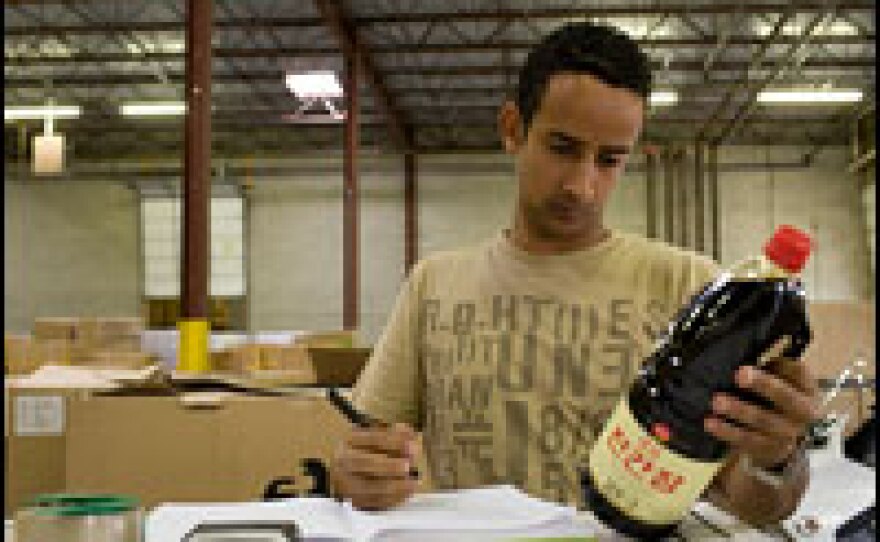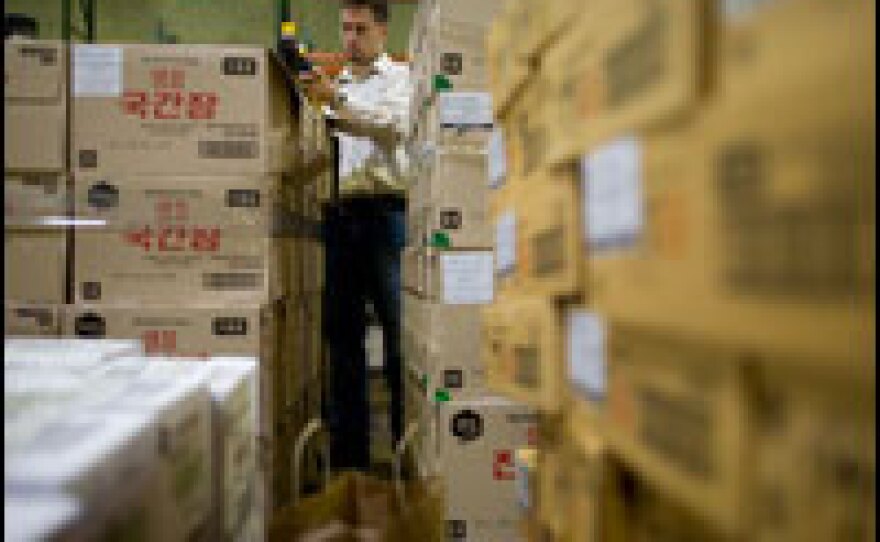

The president, the new head of the Food and Drug Administration, and some members of Congress have all said in the last couple of months that cleaning up the nation's food supply is a major priority.
Their concern comes after outbreaks of illness in hundreds or thousands of people caused by contamination of such staples as peanut butter and spinach. But while those national outbreaks have received a lot of attention, the day-to-day risks are already high. The government estimates that every year 75 million Americans are sickened by food. About 375,000 are hospitalized, and 5,000 die.
Dean Cook is doing his best to reverse the trend. An FDA supervisor at the Port of Baltimore, he manages import programs in the FDA's Baltimore district office. Before a ship reaches port, the FDA receives a list of all the foodstuffs on it. Last year, 190,000 items came into their port.
Agents select products they want to look at more closely. The products are brought to a warehouse a few miles from the port and checked over. Samples from some products are sent to a lab for analysis for pesticide residues, microbes and other contaminants.
Quite often problems are obvious, Cook says. "We may see swarms of insects, we may see leaky cartons, we may see swollen cases, we may see rodent infestations." Sometimes the problems are with the labels that incorrectly identify the food, or the amount, or the product inside.
Products with problems are detained and destroyed. "The average detention rate of product in Baltimore district is probably 9 percent of what we look at," Cook says. "That could be something as simple as a labeling problem, or it could be something as serious as salmonella ..."
Cook's work is part of a massive effort by the FDA to check both domestic and imported food. In addition to port inspections, the agency has mobile labs that go around the country checking on fresh produce and seafood. David Acheson, the associate commissioner for foods at the FDA, says the agency is facing a different food world than when most of the laws covering food safety were written.
"Consumer demands for products 24-7, 365 days a year has led to lots of increase in imported foods. We've got FDA regulated foods coming in from over 150 different countries through over 300 ports," he says. And, he points out that within the United States, a small food plant in Georgia sold peanut products that contained salmonella bacteria to over 400 companies. Those companies, in turn, used the contaminated product to make food that was shipped all over the country.
The FDA is determined to add prevention to its portfolio, says Acheson. "Traditionally the FDA has reacted to problems. We'll continue to react to problems, but the key is preventing the problems in the first place," he says.
The agency has set up permanent offices overseas in places such as India and China. It's increasing the number of times it's inspecting foreign food producers, from about 100 a year to 1,000. That's not enough, says Acheson, but it's a start.
Meanwhile, Congress is considering food safety legislation that would give the agency more money and power to inspect domestic food processors, to trace food from origin to dinner plate, to assess fines on miscreants, and to recall food. Legislators are working out details now, and both consumer groups and industry are backing the bill, giving it a good chance of passing this year.
Change couldn't happen too soon for Nancy Donley. She lost her only son 16 years ago when he was sickened by E. coli bacteria in hamburger meat. She's the founder of Safe Tables Our Priority (STOP), one of the consumer groups pushing Congress to act.
"We deserve to assume that government and industry is doing everything they can to make it as safe for us as possible," she says.
But she doesn't think we're there yet. So she approaches her food as if it's already contaminated, and follows the advice of food safety experts. She doesn't let the cutting boards and utensils she uses for raw meat, poultry and fish contaminate the ones she uses for anything else. She uses a meat thermometer. She carefully washes her fruits and vegetables even if the packaging says it's already been washed.
And she follows the rules consistently. "It's one thing to be educated and know what to do," she says, "and it's another thing to put it into practice."
The FDA recently announced strict new regulations for egg producers. They have to keep their product refrigerated and clean, from hen house to supermarket. FDA Commissioner Margaret Hamburg said the agency is stepping up its efforts dramatically, but consumers play a role as well. "People should put their eggs in the refrigerator," she said, and cook them fully. And if the eggs are broken or smelly, she said, throw them out.
Copyright 2022 NPR. To see more, visit https://www.npr.org. 9(MDAzMjM2NDYzMDEyMzc1Njk5NjAxNzY3OQ001))







